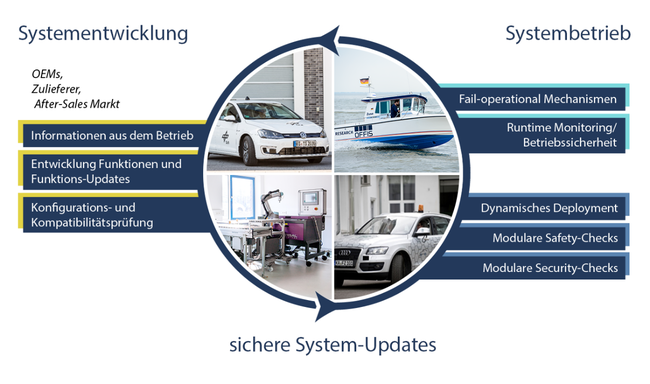Step-Up!CPS
- Contact:
- Project group:
Prof. Sax
- Partner:
OFFIS e.V. – Institut für Informatik (OFF) – Koordinator
Carl von Ossietzky Universität Oldenburg (Uni Ol) – Forschungszentrum Sicherheitskritische Systeme
Deutsches Zentrum für Luft- und Raumfahrt e.V. (DLR) – Institut für Verkehrssystemtechnik
Karlsruher Institut für Technologie (KIT) – Institut für Technik der Informationsverarbeitung (ITIV)
FZI Forschungszentrum Informatik am Karlsruher Institut für Technologie (FZI)
SafeTRANS e.V. (STRANS) – Safety in Transportation Systems
- Startdate:
01.10.2018
- Enddate:
30.09.2021
Step-Up!CPS: „Software-Methoden und Technologien für Modulare Updates von Cyber-Physischen Systemen“
![]()
Motivation
In almost all branches of industry, cyber-physical systems (CPS) already perform not only comfort functions but also safety-critical control functions such as automated driving or the control of production facilities. Due to the high potential for damage in the event of malfunctions and the great complexity of these CPS, their modular update capability during operation - i.e. the updating of individual, even safety-critical functions with demonstrable preservation of the operational safety of the overall system, in accordance with national and international research roadmaps - is a central key to the safety, performance and efficiency of future CPS.
In contrast to smartphones and PC operating systems, where regular updates are part of everyday life, updates of safety-critical CPS place significantly higher demands on the architectures of these systems and the security of their updates. New methods, technologies and processes are needed to prove that the operational reliability of the updated systems can be maintained. At the same time, new methods and technologies are needed in order to be able to manage the enormous range of variants and configurations for updates in the field. Future technologies for the update capability of (safety-critical) CPS have a major market-relevant leverage effect, but no viable concepts and methods exist to date.
Goals
As part of funding line A - basic-oriented projects - of the call "Research projects to improve the exploration and integration phases of ICT research", this research network of leading universities and research institutes in the field of CPS research plans to research cross-domain software methods, technologies and processes for secure, modular CPS updates, to implement them as proof-of-concept and to evaluate and demonstrate them in the partners' research infrastructures in three application areas (Automotive, Industry4.0, Maritime) on the basis of use cases.

Figure - Overview of the phases and activities of the CPS update process
Following the conceptualization and development of the update process, the required methods and the middleware, an update of a system function realized by software is carried out for each application domain with the help of a demonstrator.
Approach
Using the research infrastructures of the partners (Application Platform Intelligent Mobility - DLR; Test Area Automated Driving (TAF) - FZI; Industry4.0 Laboratory IKIMUNI - OFFIS; eMaritime Integrated Reference Platform - University of Oldenburg/OFFIS) and the large partner networks of the project participants, the results are developed in an open innovation process that involves industry partners from the Advisory Board of Step-Up!CPS and other partners as "idea providers", "concept testers" and future users of the project results from the very beginning. This process will be led by the consortium partner SafeTRANS - a competence network for safety-critical embedded systems and CPS consisting of German representatives from industry and research.
The research will be embedded in a context with four different use cases from the automotive, maritime and industrial automation application fields. This results in generic and domain-specific interoperable technology solutions and software tools that enable modular CPS updates.
Approaches from model- and contract-based design are used to formally describe the current configuration of a CPS and the assurances of the virtualized hardware.
In addition, methods and software tools are being developed in this project in order to develop the modular assurance of an update not only for a single system, but for entire product lines with a very high number of variants. To this end, an efficient test strategy is being developed and corresponding configuration and compatibility checks are being carried out.
For the development of the middleware, the software architecture of the CPS middleware is being researched and developed, and virtualization approaches are being expanded in order to achieve a complete decoupling of SW functions and HW components with regard to computing resources, memory and I/O resources.

